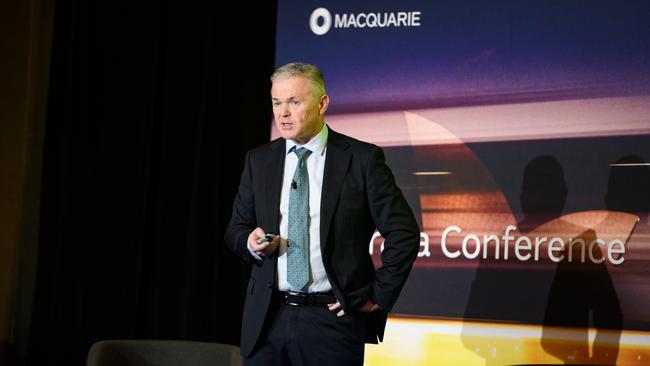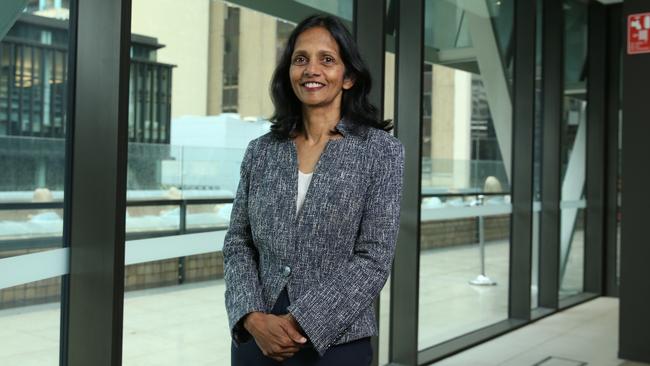Governments risk losing the mandate for Australia’s energy transition as costs pose issues


The event, held without fanfare one evening last week via LinkedIn, touched on the need for longer-term policy settings and clarity in energy transition regulation.
It made clear that what lies ahead is a long and bumpy road for the economy and consumers of energy, as the shift to cleaner forms of power occurs.
Macquarie’s CEO Shemara Wikramanayake, as well as moderating the discussion, said consumers didn’t fully grasp the increased energy cost and reliability challenges that lay ahead.
“Once it starts swinging then you start losing the mandate for this transition. But it’s too late because we haven’t created the back-ups, which is a challenge.”
Her point is a highly valid one.

While there is urgency in meeting net zero emission targets by 2050, it’s clear that sensible policy that balances household and economic costs, reliability of supply and wholesale emissions reduction is needed. Electrification by households is part of the solution, through solar and batteries, but again that is made challenging when inflationary pressures have persisted and put the investment out of reach for many Australians.
This debate becomes even more pertinent as Australians are set to swelter through another extremely hot summer, particularly if the heatwaves in the northern hemisphere provide any guide of what’s ahead.
While a large-scale crisis in NSW was averted in late November, the Australian Energy Market Operator did note that “some reserve issues” were being forecast in NSW this week.
Santos boss Kevin Gallagher lamented at the Macquarie conference that oil and gas companies were often excluded from the national energy transition conversation. He noted cost of living pressures were, in his view, the biggest risk of the move to net zero by 2050.
“If we don’t manage the transition in a very orderly fashion, we’re going to impact people’s quality of life to the point where that will slow it down dramatically,” Gallagher said, noting he believed the best policies were technology agnostic, allowing the market to drive innovation and change.
“It’s astonishing the oil and gas sector is banished from the conversation with certain governments. I mean who is it you want to transition?”
Origin’s CEO Frank Calabria urged governments to make long-dated decisions, including around the planning cycle for the development of infrastructure related to the energy transition.

He said rural communities felt they were “wearing the burden” as it related to a scaling up of the nation’s renewable energy sources.
“As you move away from fuel-based generation into renewables where governments are likely to overbuild renewables, there’ll be a lot of energy but it won’t be produced at the time that everyone’s going to demand it.”
Calabria cautioned on the fragility of the energy system and said it was becoming “increasingly valuable” to have an ability to match energy demand in real time.
Federal and state governments need to tackle these issues head on and think laterally about solutions.
One interesting initiative that makes a lot of sense is ramping up renewable power usage in schools, given their hours of operation. In NSW, a pilot project for public schools is underway and has featured about 80 schools taking part in a project that is testing solar and battery storage systems alongside “demand response” controls in airconditioning.
Large scale rollouts of this nature would certainly boost electrification, but again a detailed cost-benefit analysis needs to be undertaken.
Further complicating the energy transition are moves by several companies to scrap projects in areas such as green hydrogen.
Billionaire Andrew Forrest in July abandoned his ambitious green hydrogen targets in a backdown that accompanied a sweeping restructure at Fortescue.
Origin Energy has also scrapped its plans for an investment in a hydrogen hub in NSW’s Hunter Valley, given the questionable economics of clean hydrogen projects.
Those market-driven decisions came despite the federal government earmarking about $8bn in broader investment and support for hydrogen production.
The Albanese government is banking on its Future Made in Australia plan to guide the energy transition path, of which $22.7bn has been committed over the coming decade.
It’s already a fragile path the nation is embarking on, further complicated by a second Donald Trump presidency in the United States and the implications that will have on the global energy transition.
There’s no time to waste in setting a clearer blueprint for the future that balances the needs of consumers and business stakeholders.





The key takeaways from Macquarie Group’s latest Green Energy Conference – which headlined the chief executives of Origin Energy and Santos – were the ever-present risks of a poorly managed transition.